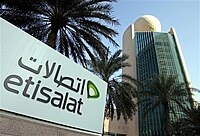| (Photo credit: Wikipedia) |
I've got telco form, in short.
I knows me telcos.
So it is with considerable confidence I can assert that never in my life have I ever encountered a telco as woefully useless as the UK's EE. We're not talking just averagely bad, we're talking organisationally dysfunctional to an extraordinary degree. We're talking spectacularly bad in a sort of massive display of really bad fireworks of badness bad. I wonder they remain a viable business, so awed am I by the symphonic virtuosity of their badness.
It's truly incredible, a Harvard Business School case study in how an organisation can remain profitable whilst exhibiting a stellar disregard for its customers. If you're in the customer service business, give up. Go home. You're wasting your time. That EE is still trading demonstrates for all time that the customer really doesn't matter.
I'm not going to bore you with the whole story. But you'll get an idea of how awfully bad they are when I tell you that I finally gave up and walked into one of their stores to get help fixing my issues with their awful service, blitheringly incompetent UX and heart-attack inducing IVR-driven call centre.
"I know," said the chap in the shop. "We're really, really bad. And there's nothing I can do about it, they don't trust us to get access to anything here in the shops, you'll have to talk to the call centre. It's frustrating, I know, but there's nothing I can do for you."
"But there's no way you can ever speak to a human at the call centre. You're just stuck in the system and when you eventually find your way to the option to talk to a representative it hangs up in your face."
"Yup. I know. Everyone hates us."
It's an interesting customer service technique. My frustration and anger were instantly defused. If it's so bad their own people have given up, what chance do I have? I eventually managed to find a way around my issue, albeit an inelegant one, but then found their iPhone app crashing every time you tried to invoke it. Reboot mobile, no change. I went to another EE store.
The bloke in the store grimaced. "Yes our app does crash. It does it on my iPhone, too. Look, I'll show you. There. Crashes every time. Bad, isn't it?"
"But a telco in the smartphone era whose app crashes on the world's most iconic smartphone platform is surely on a one way ticket? It's almost unbelievably incompetent."
"I know. But what can we do? We just work in a shop."
In fact, EE's service is so bad, it got fined £1 million by UK regulator OFCOM. Googling 'EE customer service' gets you access to a very deep bucket of ordure indeed. It's the UK's most complained about mobile operator, as it turns out. And that seems to be quite an achievement in itself given the tone of debate around the other operators.
Which is why, coming back to the UAE from leave, I found myself looking at Gerard Butler gurning at me from a green-tinged billboard and thought, almost fondly, 'You know what? It might still be running the dumbest, most ill-advised campaign in the history of telco promotion, but Etisalat isn't all that bad.'
Yup, you heard it here first. Challenge accepted. Etisalat vs EE? I'll take the home team any day...








